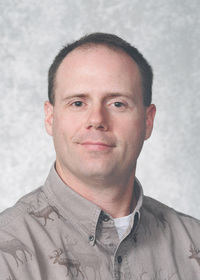Information Possibly Outdated
The information presented on this page was originally released on April 27, 2016. It may not be outdated, but please search our site for more current information. If you plan to quote or reference this information in a publication, please check with the Extension specialist or author before proceeding.
CAPPS exposes agricultural paths to Choctaw teens
STARKVILLE, Miss. -- Choctaw Central High School senior Jasmine Hickman has known for a while that she will be a student at Mississippi State University next fall, but she didn’t know about the range of careers she could pursue in agriculture and natural resources.
Hickman is now reviewing all these options after having her eyes opened through a new MSU mentor program that she and 20 other Choctaw teens recently participated in.
“There are more opportunities for agricultural careers than I was aware of before,” Hickman said. “We met several faculty, and when they described what they do, it sounded like something I’d like to find out more about next fall.”
The Choctaw Agriculture Professionals Program for Students, or CAPPS, is the culmination of a relationship Jim McAdory has been working to foster between the tribe and MSU for several years. As the MSU Extension Service agent for the only Native American reservation in the state, McAdory said he sees a disconnect between Choctaw youths and agriculture and is working to close that gap. This effort eventually developed into CAPPS.
The participants were part of Choctaw Central’s “20-plus club,” or students who made a 20 or above on the ACT college readiness assessment.
“These kids are the best of the best at Choctaw Central and are going to college somewhere, but they did not come from agricultural homes, so their exposure to agriculture is limited,” McAdory said. “When I found out about the 20-plus club, I approached the principal and teachers to see if they wanted to try this program and if they thought it would be good for students. They all agreed it would be beneficial.”
Students toured multiple MSU facilities, including the R.R. Foil Plant Science Research Center, the MSU College of Veterinary Medicine, the South Farm Aquaculture Facility at the H.H. Leveck Animal Research Center, and the Thad Cochran Research, Technology and Economic Development Park.
They also met with faculty from the Mississippi Agricultural and Forestry Experiment Station and representatives from the U.S. Department of Agriculture Farm Service Agency, the Natural Resources Conservation Service and the Sam D. Hamilton Noxubee National Wildlife Refuge.
“I wanted to expose these students to agricultural and natural resource careers and show them people who chose this career path and wanted to do this for a living,” McAdory said. “Whether they pursue similar careers or not, they at least learn about everything MSU has to offer. With a close-knit group of people, there’s sometimes a reluctance to stray from their community, so what they did by going through this program is groundbreaking.”
McAdory said he hopes the program establishes the same kind of familiarity between MSU and Choctaw teens that the young people already feel within their tribal community.
“Breaking barriers is part of any positive youth development program,” he said. “I want this experience to help these kids build on their strengths, help them overcome their weaknesses and show them how successful they can become if they work for it.
“I asked the kids when we first met if any of them were interested in an agricultural or natural resource career, and none of them were. Now, I’ve got one confirming that he wants to pursue and another considering it,” McAdory added. “I want them to embrace that agricultural and natural resource management is at the root of their culture and be proud of it.”





